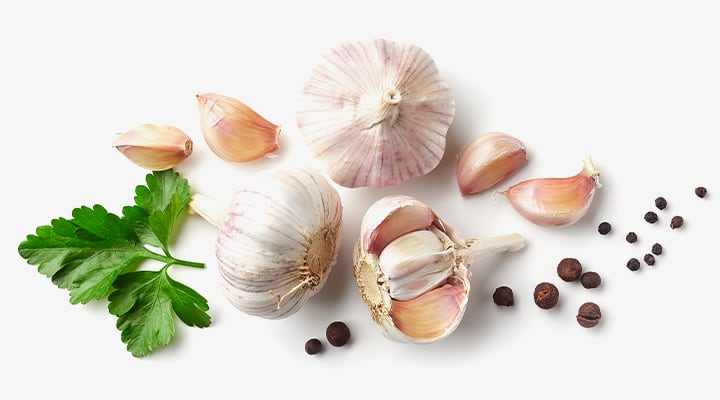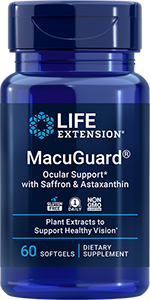
Newsletter
Newsletter
Trial finds improvement in metabolic syndrome components, fatty liver, insulin resistance in garlic-intake participants

A randomized trial reported on May 11, 2021 in Phytotherapy Research found an association between intake of garlic and improvement in several components of metabolic syndrome—a cluster of factors that increase the risk of developing diabetes and/or cardiovascular disease. The trial also revealed a reduction in insulin resistance and fatty liver—conditions that are common among metabolic syndrome patients.
Metabolic syndrome is defined as the presence of three of the following five disorders: abdominal obesity, high blood pressure, high triglycerides, elevated blood sugar and low levels of high-density lipoprotein (HDL) cholesterol.
The trial included 90 men and women with metabolic syndrome who received tablets containing 1,600 milligrams garlic powder (which provided 6 milligrams per day of the garlic compound allicin) or a placebo daily for three months. Blood pressure, fasting glucose, triglycerides, HDL cholesterol, gamma-glutamyltransferase (GGT, an enzyme that is elevated in liver disease and also is associated with cardiovascular disease and diabetes risk), appetite (including hunger, fullness, desire to eat and ability to eat), height, weight, waist circumference, food intake and physical activity were evaluated upon enrollment and at six and twelve weeks.[1, 2] Serum insulin levels were measured at the beginning and end of the study.
At the trial’s conclusion, participants who received garlic had levels of beneficial HDL cholesterol that were significantly higher than the beginning of the study as well as higher in comparison with the placebo group, whose levels declined. Systolic and diastolic blood pressure, triglyceride levels, waist circumference, insulin and insulin resistance, GGT and fatty liver index (calculated by a standard formula using other measured parameters) were all reduced in the garlic-intake group compared to the placebo. All parameters related to appetite were also improved compared to placebo.
“To the best of our knowledge, there is no clinical trial evaluating the effects of garlic consumption on insulin resistance, appetite, and fatty liver index (FLI) as an accurate predictor of hepatic steatosis among subjects with metabolic syndrome,” authors Abbas Ali Sangouni and colleagues announced.
“Our study demonstrated a significant decrease in the mean intake of calories after 3-month garlic powder [intake],” they also noted. “There is no clinical trial evaluating the effect of garlic on appetite.”
The current findings reveal a benefit for garlic intake against metabolic syndrome components and related factors. Considering garlic’s low cost and wide availability, as well as its prebiotic action and cardiovascular benefits, adding garlic to a healthy diet and exercise regimen could be an easy and effective measure to help protect against metabolic syndrome and its associated disease risks.
References
- Neuman MG et al. J Pharm Pharm Sci. 2020;23(1):65-74.
- Lee DH et al. Diabetologia. 2003;46(3):359-64.
Products
Apply What You've Learned: Metabolic syndrome
- It has been estimated that 10% to 50% of the world’s population has metabolic syndrome.1 If you have three out of five possible metabolic syndrome components (abdominal obesity, high blood pressure, low high-density lipoprotein [HDL] cholesterol, high triglycerides and elevated blood sugar), the time to act is now to lower your risk of diabetes or cardiovascular disease.
- A healthy diet that contains a moderate amount of calories, an abundance of plant foods and little in the way of saturated fat and added sugar may be helpful for people with metabolic syndrome. A Mediterranean diet is ideal!2
- Increasing activity levels and improving fitness can both help protect against and reduce the impact of the metabolic syndrome.3
- Fish oil is another nutrient that may help improve multiple features of metabolic syndrome. Fish oil has been shown to improve insulin sensitivity and reduce triglycerides and blood pressure. It also improves multiple markers of inflammation.4-6
- Please consult your health care provider if you have any of the components of metabolic syndrome. While many individuals can keep metabolic syndrome at bay through a healthy diet and lifestyle, others may need medical therapies for one or more of its components.
References
- de la Iglesia R et al. Int J Mol Sci. 2016 Nov 10;17(11):1877.
- Kastorini CM et al. J Am Coll Cardiol. 2011 Mar 15;57(11):1299-313.
- Myers J et al. Nutrients. 2019 Jul 19;11(7):1652.
- Al-Gayyar MM et al. Pharm Biol. 2012;50(3):297-303.
- Geleijnse JM et al. J Hypertens.2002;20(8):1493-9.
- Gao H et al. Lipids Health Dis. 2017;16(1):131.
Featured Life Extension Magazine® Article
Heart Attacks Are Not Worth Dying For, by Michael Ozner, MD
Heart Attacks Are Not Worth Dying For is the latest book by cardiologist Michael Ozner, MD, of Baptist Health South Florida. In this new interview with Life Extension, Dr. Ozner asserted that heart disease, once considered an inevitable part of aging, can be prevented and reversed.
“We can prevent coronary heart disease by attacking and eliminating the primary cause—an excess number of cholesterol—and triglyceride-carrying particles called lipoproteins,” Dr. Ozner explained. “When there are too many potentially harmful (apoB) lipoprotein particles in the bloodstream, they can enter the blood vessel wall and lead to an atherosclerotic plaque.”
Lifestyle changes advocated by Dr. Ozner include consuming a Mediterranean diet, exercise, stress reduction, smoking cessation and quality sleep. Advanced blood testing, vascular imaging and effective medications may also be utilized. The acceptance and adoption of these measures by a significant portion of the populace will signal the dawn of a new era in heart health and longevity.
What's Hot
Health Concern
Drinking coffee could lower risk of metabolic syndrome
Research discussed during a satellite symposium hosted by the Institute for Scientific Information on Coffee at the 13th European Nutrition Conference consolidates the latest findings concerning the beverage’s protective effect against metabolic syndrome.
Diabetes and Glucose Control
Diabetes mellitus is characterized by high levels of glucose in the blood.
Related Life Extension Magazine® Articles

Fish Oil Fights Metabolic Syndrome
Nearly half of Americans over 60 have metabolic syndrome. Omega-3 fatty acids found in fish oil can decrease risk and reverse certain aspects of metabolic syndrome.

Vitamin K Promotes Healthy Blood Sugar Metabolism
A recent study found that vitamin K can reduce the risk of developing type II diabetes by 51% and inhibit metabolic syndrome.
Life Extension Magazine® Issue Now Online
A remarkable number of healthy-longevity findings have been published over the past 18 months.





